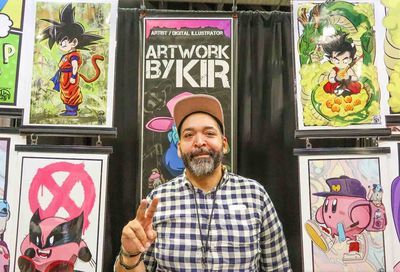I Swear
Alphabet Soup
I have a pottymouth. I curse like a sailor.
I think nothing of tossing around the f-word, the s-word, the p-word, the d-word (even in a combination that quite clearly takes our Lord’s name in vain) or any of the various b-words.
I have had e-mails to more than one friend “quarantined” and just plain rejected by touchy workplace e-mail censor software — including, at times, things I have written in this very column space.
I grew up in a household where adults swore freely. Children, if they knew what was good for them — and we did, my brother and I, we did — dared not curse at all, not even on the playground amid the secret society of trusted friends, not even when quoting. I will confess to having sometimes used the cutesy, spelled-out “H-E-double hockey sticks” — but not very often. No way.
My mother likes to tell the story of how I ran inside when I was young, tattling that my cousin was outside saying “bad words.” My mom asked me what he was saying, and I refused to repeat the atrocious language. “I can’t say it,” I told her. “I’m too leetle.”
When I was in eighth grade, I actually asked permission to say “crap” and “butt,” because I believed I had reached an age where using this relatively mild language was appropriate. My mom easily granted permission; after all, I had spelled the words when I asked if I could start saying them, and how precious was that?
By high school, I had become careless with the R-rated language. I suppose I thought it gave me more cachet with my friends, since I was the one who never drank and had, for so long, held out from swearing of any sort.
I could embark on some queer theory rant about how leetle lesbians like me knew (without really knowing) how important it was to be really good since we were carrying around this loaded information that many people would classify as bad. And I could spout off about how we were so good when we were good, and then got so bad when we finally felt liberated to be bad.
I never did get to be so bad — except where my pottymouth was concerned. Queer theory aside, I blame my transgression on lesbianism.
Not my lesbianism, mind you. It was the fault of this neighbor of ours when I was a kid, a friend of my mom’s. Her name was Pam, and although I think she was resisting it at the time, she turned out to be a lesbian.
Pam had a real pottymouth too, and it was from her that I first heard the word “bastard” when I was young. I had no idea what it meant, and given Pam’s penchant for swearing, I figured it wasn’t something I should say out loud. But I had heard the works from my mother’s own then-nasty mouth (now she talks like a church lady, biting her tongue when inclined to utter even the daintiest swear word), and from my dad, too. I had built up a silent dictionary of these curses — spelling, pronunciation, part of speech, definition, etymology — but was determined to never speak them aloud.
So when I heard “bastard” for the first time and it wasn’t from either of my parents, I was puzzled. I waited for a clue while eavesdropping on subsequent conversations, but nothing presented itself. It continued to eat away at me; I was already a little wordsmith and was determined to file linguistic information in the proper places.
I looked for guidance from my older brother, Mike, who was as Puritan as I was about language. He was wiser than I was and much more confident, so I often turned to him when something bothered me.
One night we were upstairs, stealthily playing with crayons and a lamp, coloring designs on squares of paper and then pressing them against the lit-up light bulb for the cool neon effect the colored wax produced. I am sure my mother would not have considered this “good kid” behavior, since it was clearly a fire hazard, but it was about as daring as we got in those days.
She was downstairs. It was the perfect time to ask him. So I took one of the crayons and I wrote “bastard” on a small square of paper. I am proud to say I spelled it right. I did not hold it against the light bulb, but instead handed it to Mike and said, “What does this mean?”
He did what any nurturing, loving big brother would do. His face lit up and he said, “Ummmm! I’m telling!!!”
I panicked. “No! Don’t tell! I just want to know what it means! I didn’t say it! Don’t tell Mom!” But he refused to relent, saying I would be in big trouble.
There was only one way to deal with this crisis. I raced down the stairs to reach my mother before he did. Out of breath, I told her, “I wrote a bad word. I wrote a bad word. Mike’s going to tell on me. I’m sorry. I’m sorry!” By this time I was crying. Mike was standing behind us, smirking triumphantly — he had avoided snitching but was also able to watch me hang.
My mom, reminded of how leetle I once was, asked me what the word was. I refused to say it out loud, or even spell it for her after what I’d just been through. All I would give up was that it started with a B. She was on the phone at the time with Pam, who started tossing out b-words that my mom repeated to me.
“Bitch?”
“No!”
“Balls?”
“No!”
“What was it?”
“I can’t say it! I can’t say it!”
Finally, Pam came up with “bastard.” I cried harder as I confirmed that selection and braced myself for my punishment.
“It’s OK,” she told me.
Pam eventually came out as a lesbian and later moved to a different town, so we didn’t see her so much, or hear much from her foul mouth. I eventually came out as a lesbian and can count on one hand the number of times I have sworn around my mother (“butt” and “crap” excepted).
Since I entered adulthood, she has enjoyed teasing me those few times she’s heard me say “bad words.” But ultimately, including the time I wrote “bastard” in an effort to expand my mind, it’s all OK. Just like when I unintentionally followed in Pam’s footsteps and became a lesbian.
It’s all OK.
Kristina Campbell writes this $*&#@%^ “Alphabet Soup” column biweekly. She can be reached at kcampbell@metroweekly.com.
Support Metro Weekly’s Journalism
These are challenging times for news organizations. And yet it’s crucial we stay active and provide vital resources and information to both our local readers and the world. So won’t you please take a moment and consider supporting Metro Weekly with a membership? For as little as $5 a month, you can help ensure Metro Weekly magazine and MetroWeekly.com remain free, viable resources as we provide the best, most diverse, culturally-resonant LGBTQ coverage in both the D.C. region and around the world. Memberships come with exclusive perks and discounts, your own personal digital delivery of each week’s magazine (and an archive), access to our Member's Lounge when it launches this fall, and exclusive members-only items like Metro Weekly Membership Mugs and Tote Bags! Check out all our membership levels here and please join us today!




















